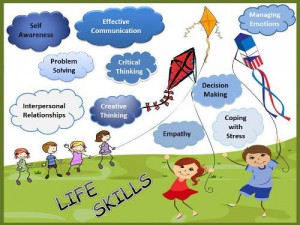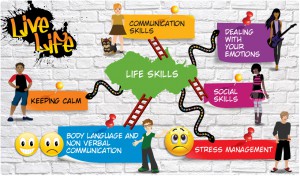Life Skills is a term that describes skills that help us manage everyday situations and problems. We are not born with them, we have to be taught and trained in order to acquire them. Creativity, critical thinking, problem solving and decision making skills, communication and cooperation, active citizenship, personal and social responsibility are essentail components for the demands of the 21st century society and the success in our lives. In 2006, the European Union (EU) established the European Framework of Key Competences to ensure that these key competences are fully integrated into the partner countries’ curricula, strategies and infrastructures, particularly in the context of lifelong learning.
The eight Key Competences are:
- communication in the mother tongue
- communication in foreign languages
- mathematical competence and basic competences in science and technology
- digital competence
- learning to learn
- social and civic competences
- sense of initiative and entrepreneurship
- cultural awareness and expression
The Key Competences can’t be promoted and developed without the support and interaction of the Soft Skills or Life Skills that are equally important. What is commonly said is that Key Competences and degrees will lead you to a job interview but to get and keep the job you’ll surely need Soft or Life Skills.
The following activity occured to me after a seminar on Life Skills in the British Council. I distinguished that in particular because I thought it was quite interesting and I could adapt the content to fit an English class of primary students, although I haven’t had the time to do it yet. It could also be integrated into an eTwinning project as an activity.
LEARNING (ETWINNING) ACTIVITY
TITLE: “FULL SAIL FOR THE FUTURE”
GRADE LEVEL: 10-12
AIM: Development of creativity, critical thinking, problem solving and decision making skills, practice on active citizenship, cultivation of dialogue, personal and social responsibility and argumentation for or against other people’s decisions.
COGNITIVE AREAS INVOLVED: English Language, ICT, Art, Citizenship (teaching of principles and attitudes) and interdisciplinary concepts of the Greek education curriculum (peace, cooperation, friendship, etc).
WEB 2.0 TOOLS:
1) www.padlet.com for the presentation and introduction of pupils.
2) www.drawitlive.com for the creation of a common project logo (probably concerning travel or ship).
3) www.polldaddy.com for the selection of votes and preferences in the logo competition.
4) www.kizoa.com for the presentation and illustration of equipment and necessary supplies for the trip (cards of objects, ideas, values).
5) www.tricider.com to argue for or against some supplies for survival and life.
6) www.issuu.com / www.youblisher.com for the publication of the story or the fairytale that will describe and illustrate the adventure.
7) www.answergarden.com for the evaluation of the activity.
8) www.wordle.com for the creation of a word cloud with the pupils’ comments and impressions.
9) www.penzu.com a digital diary of the project for the evaluation of the whole activity and the learning results (Reflective Thinking).
ACTIVITY PROCESS:
1st STEP: Each student presents him/herself and their personal mottos for life on a common digital dashboard.
2nd STEP: The students work in mixed ability (and transnational) groups on drawitlive. There can be a logo competition for the activity or the whole project. The votes can be selected with digital polls.
3rd STEP: How do you dream of your future trip? The students draw and colour all the necessary supplies and equipment for the trip (including values, ideas and attitudes) in groups. They can make cards (of justice, friendship, modern clothes, etc). They present all of them on a digital slideshow tool. They can also stick them on a dashboard in the classroom.
4th STEP: The groups argue for and against the things that should be abandoned if they want to save their lives and arrive safely at a place using a public discussion tool. They have to decide on the most important things for life and which of them will be kept in every phase of their journey to the future.
5th STEP: Their adventure is described and illustrated by the students and published as a travelling album with the support of a publishing tool.
6th STEP: The students self-assess their performances and evaluate the activity. Their comments and impressions are depicted on an opinion selection tool and then are presented as a word cloud with the support of the appropriate web tool.
7th STEP: The teachers evaluate the whole activity and the learning outcomes in a digital diary especially engaged for the so called Reflective Thinking.
EXPECTED LEARNING OUTCOMES:
- The students will use the English language as a communication tool and they will develop linguistic skills.
- They will use debate techniques to express their opinions, to argue and convince their interlocutors.
- They will consider and evaluate ideas and opinions they agree or disagree with, respecting all of them.
- They will learn to work in groups and collaborate with other students.
- They will learn how to learn and develop initiatives.
- They will identify their position and role in the greek and wider European ‘scene’.
- They will spot similarities and differences in the culture and mentality of partner countries.
- They will communicate and create friendships on a European level.
- They will use Technology creatively developing digital competence.
(images retrieved from www.google.gr)




